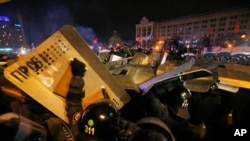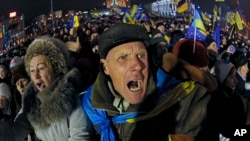KYIV —
“Go to Russia, Go to Russia,” chanted protesters as three buses loaded with Ukrainian riot police slowly retreated from their unsuccessful attack on pro-European protesters occupying Kyiv’s City Hall.
Riot police and protesters played push and pull Wednesday over the heart of Ukraine’s capital. Under the cover of darkness and helped by Arctic temperatures, riot police broke down barricades and reclaimed about 20 percent of the Maidan, the protesters’ camp.
Protester Oleg recounts how the police failed to take the opposition’s command center and shut down the sound stage: “They tried to break into the building, but they failed because actually the people stay there, and they stop.”
The police generally did not use their clubs, but 30 people were injured.
Within hours, strong reaction came from the United States.
U.S. Secretary of State John Kerry issued this statement: "The United States expresses its disgust with the decision of Ukrainian authorities to meet the peaceful protest in Kyiv's Maidan Square with riot police, bulldozers, and batons, rather than with respect for democratic rights and human dignity.”
In Kyiv, U.S. Assistant Secretary of State Victoria Nuland met with President Viktor Yanukovych and then spoke to reporters:
"I made it absolutely clear to him that what happened last night, what has been happening in security terms here, is absolutely impermissible in a European state, in a democratic state."
Clear meaning
For Ukrainians who do not understand English, Nuland’s body language sent a clear message. One moment she was on national TV standing unsmiling next to Ukraine’s president. The next moment, she was walking, smiling, through the protest camp, handing out bread and crackers to protesters and riot police.
Nuland and European Union envoy Catherine Ashton have spent a total of six hours in separate meetings with President Yanukovych, pressing him to find a political solution.
At the end of Wednesday, President Yanukovych invited the opposition to join the government in a round table dialogue to seek a peaceful solution.
From jail, former Prime Minister Yulia Tymoshenko urged the West to take even tougher steps.
She appealed in a statement: "Stop the authoritarian regime in Ukraine with financial and visa sanctions and international anti-corruption investigations. Otherwise, a cemetery of freedom will be built in Ukraine. Act!"
Increasingly, Ukraine’s president is starting to look isolated.
Two of Ukraine’s major churches, the Greek-Catholic and the Ukrainian Orthodox, condemned the latest police attacks on the protesters' encampment. As riot police gathered, protesters were summoned from sleep, not only by mobile telephone and social network messages, but by church bells ringing insistently in Kyiv’s pre-dawn darkness.
By daylight, the protest square was once again filled with defiant people, three weeks after the protest started.
A Kiev construction company director, Vladimir, was there, his red motorcycle helmet contrasting with the falling snow.
“We are going to be more and more, and the government should start thinking about that,” he said, between sips of hot tea from a plastic cup.
Further weakening Ukraine’s president, television stations owned by once-loyal oligarchs are giving increasingly evenhanded coverage to the protests.
At the same time, supporters from the president’s heartland, eastern Ukraine, have failed to materialize in the capital. In contrast, pro-European demonstrators have proved willing to drive halfway across the nation to demonstrate.
As international condemnation mounted Wednesday, an order was given. Suddenly, the riot police fell back.
As soon as they withdrew, protesters started rebuilding a wooden barricade, one that police had cut with chainsaws only hours earlier.
Riot police and protesters played push and pull Wednesday over the heart of Ukraine’s capital. Under the cover of darkness and helped by Arctic temperatures, riot police broke down barricades and reclaimed about 20 percent of the Maidan, the protesters’ camp.
Protester Oleg recounts how the police failed to take the opposition’s command center and shut down the sound stage: “They tried to break into the building, but they failed because actually the people stay there, and they stop.”
The police generally did not use their clubs, but 30 people were injured.
Within hours, strong reaction came from the United States.
U.S. Secretary of State John Kerry issued this statement: "The United States expresses its disgust with the decision of Ukrainian authorities to meet the peaceful protest in Kyiv's Maidan Square with riot police, bulldozers, and batons, rather than with respect for democratic rights and human dignity.”
In Kyiv, U.S. Assistant Secretary of State Victoria Nuland met with President Viktor Yanukovych and then spoke to reporters:
"I made it absolutely clear to him that what happened last night, what has been happening in security terms here, is absolutely impermissible in a European state, in a democratic state."
Clear meaning
For Ukrainians who do not understand English, Nuland’s body language sent a clear message. One moment she was on national TV standing unsmiling next to Ukraine’s president. The next moment, she was walking, smiling, through the protest camp, handing out bread and crackers to protesters and riot police.
Nuland and European Union envoy Catherine Ashton have spent a total of six hours in separate meetings with President Yanukovych, pressing him to find a political solution.
At the end of Wednesday, President Yanukovych invited the opposition to join the government in a round table dialogue to seek a peaceful solution.
From jail, former Prime Minister Yulia Tymoshenko urged the West to take even tougher steps.
She appealed in a statement: "Stop the authoritarian regime in Ukraine with financial and visa sanctions and international anti-corruption investigations. Otherwise, a cemetery of freedom will be built in Ukraine. Act!"
Increasingly, Ukraine’s president is starting to look isolated.
Two of Ukraine’s major churches, the Greek-Catholic and the Ukrainian Orthodox, condemned the latest police attacks on the protesters' encampment. As riot police gathered, protesters were summoned from sleep, not only by mobile telephone and social network messages, but by church bells ringing insistently in Kyiv’s pre-dawn darkness.
By daylight, the protest square was once again filled with defiant people, three weeks after the protest started.
A Kiev construction company director, Vladimir, was there, his red motorcycle helmet contrasting with the falling snow.
“We are going to be more and more, and the government should start thinking about that,” he said, between sips of hot tea from a plastic cup.
Further weakening Ukraine’s president, television stations owned by once-loyal oligarchs are giving increasingly evenhanded coverage to the protests.
At the same time, supporters from the president’s heartland, eastern Ukraine, have failed to materialize in the capital. In contrast, pro-European demonstrators have proved willing to drive halfway across the nation to demonstrate.
As international condemnation mounted Wednesday, an order was given. Suddenly, the riot police fell back.
As soon as they withdrew, protesters started rebuilding a wooden barricade, one that police had cut with chainsaws only hours earlier.





